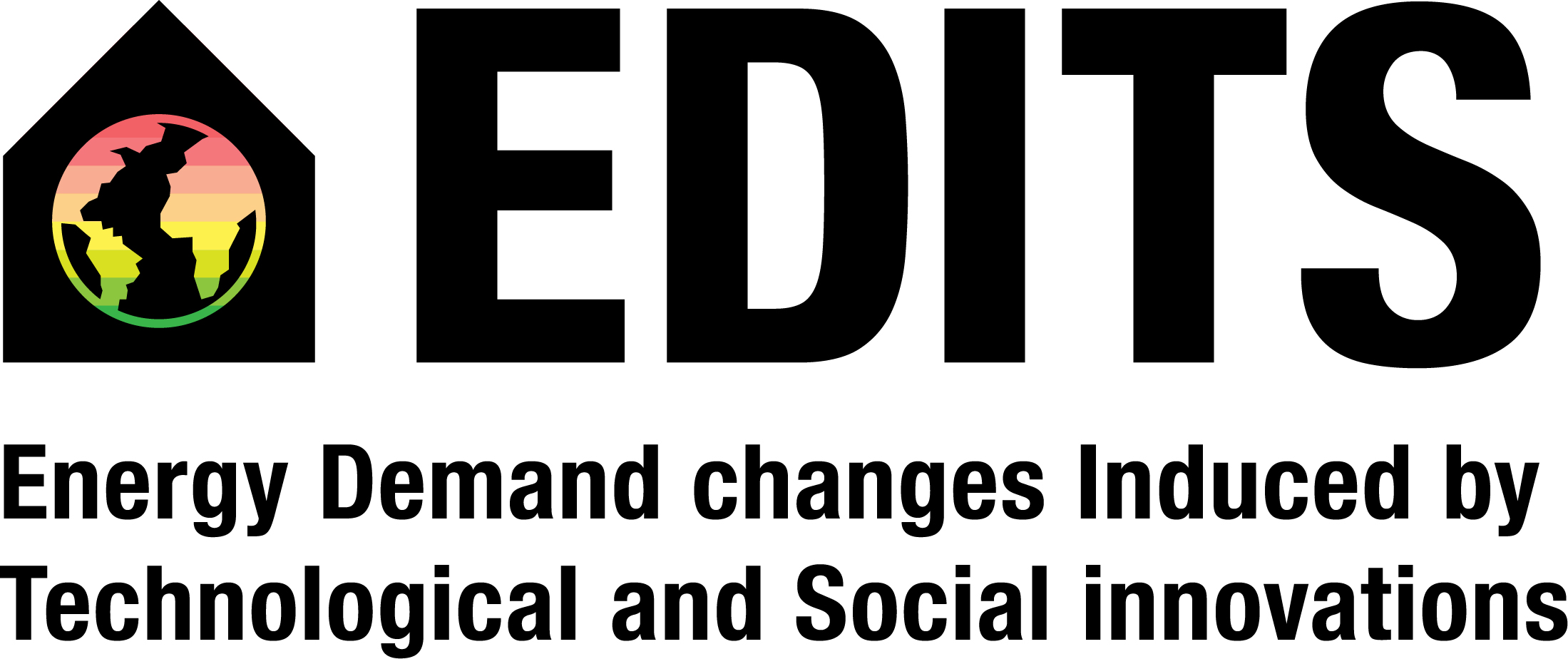
The EDITS network brings together experts of various disciplines to regularly discuss about and engage in the multi-faceted energy demand research. The EDITS community works together based on common interest in interlinked topics, on transferring methodological knowledge, and on exploring modeling innovations across demand-side models.
 © IIASA
© IIASA
Background
EDITS (short for Energy Demand changes Induced by Technological and Social innovations) is based on the seminal work of IIASA and partners on the Low Energy Demand (LED) scenario, that was published in 2018 in Nature Energy (Grubler et al. 2018) with ample supplementary information, and updates including the quantifications for water demand (Parkinson et al. 2018). LED entered into a plethora of global scenarios that could meet the Paris Agreement target of limiting global warming to 1.5°C by 2100, but others relied on negative emissions technologies. On the contrary, LED relies on shrinking the energy system through major lifestyle, behaviour, infrastructure, and business model transformations, resulting not only in a reduction of global energy use by 40% in 2050 compared to today, but also gains on equity and the SDGs.
The higher the demand, the earlier, the more stringent, and the more costly climate mitigation will have to be. Conversely, lower demands increase the temporal flexibility of climate mitigation and reduce the stringency and costs of mitigation actions, thus also reducing the risks of SDG tradeoffs.
LED is a global scenario, and calls for insights on the regional and national aspects have been received. Furthermore, assessing variations of LED and identifying practical solutions towards reaching the energy transition based on energy demand transformation is also desirable.
The scenario has been updated in 2023 as the High with Low narrative and published by IIASA.
EDITS goals
Levels and structure of energy and resource demands are increasingly recognized as key critical determinants of feasibility, timing, and costs of climate mitigation actions and their SDG synergies and tradeoffs. EDITS undertakes a deeper understanding of demand-driven energy system change, at global and granular levels.
The aim of the experts and researchers forming the EDITS network is to identify gaps and potentials to enhance modeling, analyzing, and communicating the demand-side solutions for climate mitigation and the SDGs.
Energy and resource demands themselves are intermediary variables, and it is the services and amenities that the use of energy and other resources provides. The efficiency of resource use and the efficiency of alternative service provision models thus moves into center stage of climate mitigation from a demand, or end-use perspective.
Because of the high heterogeneity of consumers and the multitude of demand types (food, shelter, mobility, communication, etc.) the theoretical understanding and modeling of “demand” (outside aggregated simplistic formulation) remains limited and fragmented, as are resulting capabilities to propose and to assess demand-side policy interventions from the twin angle of climate mitigation as well as of promoting the SDGs.
Watch a summary of EDITS here.
EDITS scientific contribution
EDITS focuses on enhancing both the human and the technical resources of demand side research and policy support by operating an expert network and a demand-side model complementarity exercise.
Work in EDITS is organized around plenary meetings and research activities in Working Groups and fast-track streams. The eight sub-groups of four Working Groups are:
| Working Group | Topic |
|---|---|
| WG 1-Buildings | Buildings sectoral modelling |
| WG 1-Transport | Transport sectoral modelling |
| WG 1-Industry | Industry/materials modelling |
| WG 2-Data | Data and parameters |
| WG 3-Narratives | Empirical grounding, updated LED-driven narrative |
| WG 3-Complementarity Protocol | Model complementarity protocol development |
| WG 3-Synthesis | Synthesis of results |
| WG 4-Wellbeing | Concepts and modelling of wellbeing |
Sectoral analyses:
EDITS reviews current practices, gaps and potentials in empirical research and demand-side modeling across three demand sectors: buildings, transport and industry. The work is extended to identifying interlinkages across sectors along a low energy demand future, as well as understanding the implications of cross-cutting aspects (such as digitalization, inequalities, energy access, decent living standards) for the sectors.
- We have reviewed low energy demand modeling in the demand sectors: a review on building sector models is published in ARER, while the reviews on industry models and transport models are forthcoming.
- Bento assessed digital convergence (link).
- Low energy demand modeling in buildings was developed here: link and link
- Transport sector assessments and modeling have been done, and published here: link, link, link.
- Industry sector assessment and modeling are published here: link, link.
- Mobility infrastructures were assessed here link.
- Implications for cities assessed here: link.
Model complementarity exercise:
Demand-side models have different goals, granularity and focus. Therefore their direct comparison does not offer the scientific insights into alternative LED-based scenarios. Instead, these models have a high potential to be linked together, and answer common questions jointly. Therefore, a complementary exercise is carried out to represent a revised, more granular LED narrative. This revised narrative is also developed within the scope of EDITS, and special focus is given to digitalization, heterogeneity, and innovation.
- Scenarios compatible with the High with Low narrative are published in the scenario database.
Energy demand data:
United efforts on data collection and identification within EDITS are expected to lead to a comprehensive, easy-to-use data catalogue, as well as to increased communication and sharing practices among EDITS members.
- The metadata platform to host and request demand-side data is found at https://edits-project.sites.uu.nl
Fast track streams:
EDITS facilitates fast-paced demand-side research that lead to high-impact outputs, such as research papers, commentaries, datasets, policy briefs, etc. We are proud to showcase examples:
-
We quantified why demand-side instruments improve energy security more than traditional policies
Bento,N., Grubler, A., Boza-Kiss, B., De Stercke, S., Krey, V., McCollum, D.L., Zimm, C. and Alves, T. 2024. “Leverage Demand-Side Policies for Energy Security.” Science 383 (6686): 946–49. https://doi.org/10.1126/science.adj6150
NEW!!! You can download it for free: https://www.science.org/stoken/author-tokens/ST-1734/full - We summarized the key missing elements of harnessing the benefits of low energy demand in a commentary paper in Joule, calling for (1) more diverse models and scenarios; (2) better data; (3) evidence on policies, societal actions, and business-models.
Meetings:
The core of EDITS is the inspirational discussions, thus members meet on a regular basis. An Annual Plenary is held every year to give space for new ideas and research topics. Quarterly meetings are held every 3-4 months, where discussions are linked to the current work of the Working Groups and fast-tracks.
Outreach and interaction with other communities:
EDITS is based on a lot of innovation and understanding. Therefore, it is core that the network is exposed to other ideas and vice versa.
- The EDITS-ARTS Competition called for submissions to imagine "life in 2050 with much less energy" into art. The pre-selected 16 artists met the EDITS Community online on a Friday afternoon, 20 May 2022, and the Evaluation Committee found all submissions unique and highly valuable and it was an extreme challenge to select the winner. For more info click here.
Webinars are announced through social media and within our networks. All recordings are available on demand here.
- "Promoting better lives is good for climate: Potential co-benefits of digital convergence and sharing in consumer goods" on 5th July 2022, presented by Nuno Bento. The recording can be found at this link.
- "Reductions in material production induced by demand-side strategies: Implications for sustainable development" on 15th September 2022, presented by Stefan Pauliuk. The recording can be found at this link.
- "Demand-side opportunities to address recent crises: recent findings from the buildings sector" on 30.03.2023 by Souran Chatterjee, University of Plymouth, and Diana Urge-Vorsatz, Central European University. The recording can be found at this link.
- "Implications of Energy Sufficiency on Electricity Demand and System Costs : a Quantified Assessment" on 17.05.2023 by Bianka Shoai-Tehrani, RTE. The recording can be found at this link.
- "Energy and wellbeing: The Indian case-study" on 14.12.2023. by several speakers, including Alessio Mastrucci (IIASA) and Souran Chatterjee (University of Plymouth). The recording can be found at this link.
Policy impact:
- EDITS held a session at the COP28 in Dubai, titled: "Demand-side solutions to disruptions", in the Japanese Pavilion on 11. December 2023. For more information click here.
- A hybrid session titled "High wellbeing with low energy demand towards modern net-zero cities" was organized in collaboration with GFSE and AEA at the IVECF on 3 November 2023. More information and registration here.
- EDITS co-organized the side-event "High well-being with low energy demand towards the modern net-zero society", held in the Japanese Pavilion at the UNFCCC COP27 on 17. Nov. 2022. For more information click here.
- A UNFCCC side-event "High level services with low resource demand for low-carbon pathways and the SDGs" was co-organized by EDITS at COP27 on 10. Nov. 2022. For more information go here.
- EDITS met European policy makers at the ECEEE Conference in France in June 2022.
- EDITS was present at UNFCCC COP26 in Glasgow, on 11. November 2021. The event information and the presentations can be accessed here.
Upcoming activities
- Quarterly online working meetings: next meeting is foreseen in June and September 2024.
- The Annual Meeting 2024 will be organized in Laxenburg, Austria between 7-11 October.
Past activities:
- Annual Conference on 7-9 November with side-events on 6th and 10th of November in Lisbon, Portugal.
- Annual Meeting in August 2022 in Laxenburg
- Annual Meeting on 9-10 December 2021
- EDITS was kick-started at the virtual Expert Dialogue in December 2020
- IIASA-RITE International Workshop in 2019: Towards improved understanding, concepts, policies and models of energy demand
- IIASA-RITE Workshop in 2018: Rethinking Energy Demand
How to join
As of March 2024, EDITS has 182 members. EDITS membership is by invitation only.
If you would like to join or would like to suggest new member(s), please send an email to edits-public@iiasa.ac.at and fill in the membership form. Note that joining organizations are expected to submit a one-pager to describe their energy demand related research agenda and how it relates to the work in EDITS (template at request).
EDITS network members
- International Institute for Applied Systems Analysis (IIASA), Energy, Climate, and Environment Program (ECE)
- Research Institute of Innovative Technology for the Earth (RITE), Systems Analysis Group
- Agence de la Transition Ecologique (ADEME)
- Asian Institute of Technology
- Beijing Institute of Technology, Center for Energy and Environmental Policy Research, CEEP-BIT
- Carnegie Mellon University
- Center for Study of Science, Technology and Policy (CSTEP)
- Central European University, Department for Environmental Sciences and Policy
- Centre for Research into Energy Demand Solutions (CREDS)
- Climate Analytics, India
- DINÂMIA’CET -Iscte, Centre for Socioeconomic and Territorial Studies
- ENOUGH Network
- European Institute on Economics and the Environment (RFF-CMCC / EIEE)
- Europa-Universität Flensburg, Energy Sufficiency Research Group (EnSu)
- EPFL Laboratory of Environmental and Urban Economics
- Federal University of Rio de Janeiro, Alberto Luiz Coimbra Institute for Graduate Studies and Research in Engineering (COPPE), Center for Energy and Environmental Economics (CENERGIA)
- Ghent University, Sustainable Systems Engineering
- Imperial College
- Jeunes Acteurs de l'Energie
- Lawrence Berkeley National Laboratory (LBNL)
- Mercator Research Institute on Global Commons and Climate Change (MCC) gGmbH
- négaWatt Association
- Oak Ridge National Laboratory
- Oeko-Institut
- Osaka University, Urban Energy System Laboratory
- Politecnico di Milano School of Managmenet
- Prayas, Energy Group
- Resource Efficiency Collective
- RTE
- Tsinghua University
- United Nations Economic Commission for Europe (UNECE)
- University of California, Santa Barbara
- University of Groningen, Environmental Psychology
- University of Freiburg, Industrial Ecology Freiburg
- University of Lausanne
- University of Leeds
- University of Lisbon, Maretec, Istituto Superior Tecnico
- University of Natural Resources and Life Sciences (BOKU), Department of Economics and Social Sciences (WiSo), Institute of Social Ecology (SEC)
- University of Oxford, Environmental Change Institute
- University of Tokyo, Institute for Future Initiatives
- University of Wisconsin-Madison, La Follette School of Public Affairs
- Universiteit Utrecht - International Research University
- Waseda University
- Yonsei University
Acknowledgements
The Energy Demand changes Induced by Technological and Social innovations (EDITS) project is an initiative coordinated by the Research Institute of Innovative Technology for the Earth (RITE) and International Institute for Applied Systems Analysis (IIASA), and funded by Ministry of Economy, Trade, and Industry (METI), Japan.



